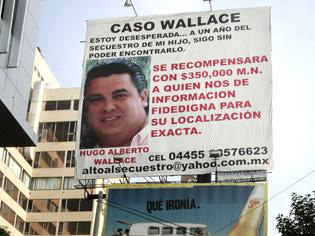
|  |  |  Editorials | Opinions | September 2008 Editorials | Opinions | September 2008  
Messages Clearly Show Innocence has Been Lost
 Luis Crosthwaite - San Diego Union-Tribune Luis Crosthwaite - San Diego Union-Tribune
go to original


| | This billboard calls for help to find a man who was kidnapped in Mexico City. (AP/Gregory Bull) | | |
They can be found along any highway in Tijuana, over bridges, improvised banners that carry personal messages, birthday wishes or declarations of love.

They are anonymous signs that lovers or friends leave for each other, simple words that try to manifest a feeling of affection and that stay up until municipal workers remove them.

Messages such as "I love you Julia," "Happy birthday my love," or "Forgive me, you know that I love you Lorenzo" tell a personal, private story in public, so not only the special person sees it but everyone who passes by.

I don't doubt that Lorenzo forgave the person who sent him the message of sincere remorse. At least, that's what I hope.

These kinds of messages have become a common decoration across Tijuana; it's temporary graffiti that doesn't do any harm and is ignored for the most part by drivers.

A few weeks ago, one of these messages caught my eye. It said, "Son, we forgive you. Please return home."

It was not a corny love note. The intent was not to create a pleasant surprise; rather, it was a plea from parents who found no other way to communicate with their son.

Recently, a different kind of improvised banner has cropped up south of the border, created by families trying to recover loved ones who have been kidnapped. These messages are desperate acts to communicate with the population, pleading for assistance, or with the very kidnappers with whom they have broken off negotiations.

Not finding help from authorities, people occasionally post banners that bear a person's photo and a plea from loved ones who don't have any news about him. "Please help us find him."

Now this same form of immediate communication is being used by the very criminals to communicate with the population, with rival bands or with the government.

Notable among these are the banners that appeared in the city of Culiacán blaming the Mexican army for supporting drug traffickers. Similarly, there was a banner that appeared in Monterrey directed at the president of Mexico, informing him that federal police and members of the military were protecting drug trafficking groups.

These messages began as signs on white sheets scrawled with aerosol paint, very similar to personal messages from young people. But as time has passed and the criminals' cynicism has grown, this form of communication has become more professional.

The one directed at the president had been generated by a computer and carried a full-color photo of Felipe Calderón. Abundant grammatical errors got a little help from a spell-checker and the image from a graphic designer.

These messages have left sentimental territory and passed to the world of fear and violence. And they are there, for everyone to see.
Luis Crosthwaite: luis.crosthwaite(at)mienlace.com |

 |
|  |



